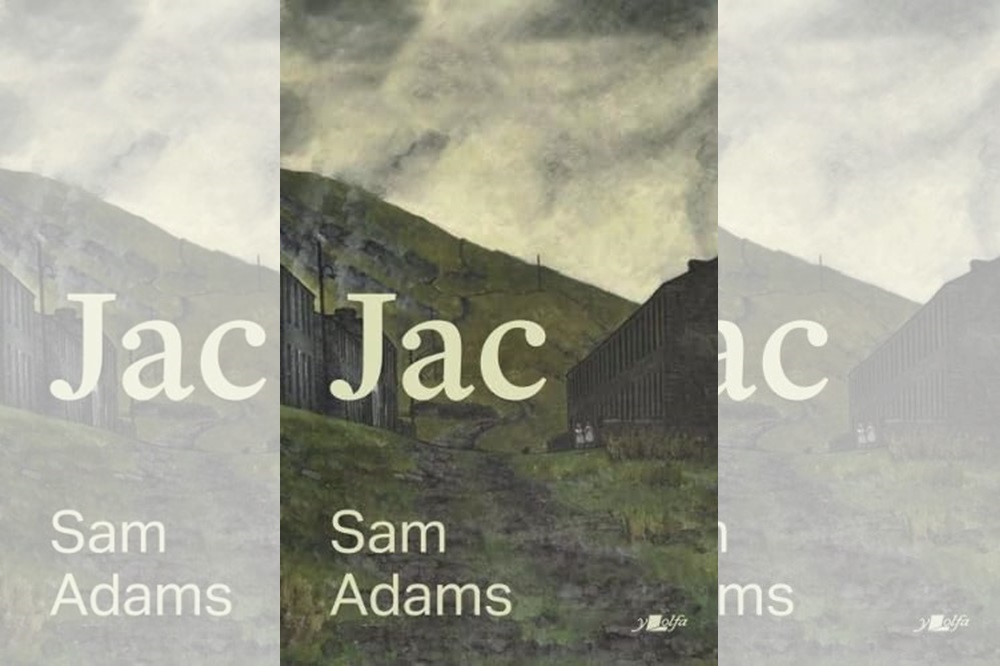Book Review: Jac by Sam Adams

Niall Griffiths
This is a tender-hearted book, with war at that heart. It does nothing original or startling with form or language but what it does, it does very well.
It’s like a cat, or a bird: perfectly itself. And as those things are an absorbing delight to watch, so is Jac a pleasure to spend time with.
I read it with a cat on my knee and sparrows at the bird feeder on the window sill and I was pretty much what could be called happy.
Seismic movement
If you have an interest in Welsh letters – and, since you’re reading this, you probably do – you’ll no doubt be familiar with Sam Adams; he’s been a constant figure in the field, editing (Poetry Wales, various anthologies, collected works of several writers), representing Yr Academi Gymreig, reviewing and critique-ing (3 monographs in the Writers of Wales series, essays in the PN Review), and a novelist in his own right (although whether Jac warrants the term ‘novel’ is moot; it’s surely ‘autobiography’ more than anything. But labels and pigeon-holes, meh).
Born in 1934 into a Glamorgan mining community, he’s lived through the sociopolitical upheavals that have beset this country and continues to do so. He embodies great change. In him is seismic movement.
Lyrically intense
And the very opening of this book – ‘once, not all that long ago, the valley was empty, the few farms lying on or over the hills to the east and west’ – is arrestingly and deceptively simple enough to make the reader think ‘okay, this might be good’.
And indeed it is; it’s the record of childhood years spent in a valleys community during WW2, lyrically intense, expertly paced, intuitively appreciative of the resonance (and respite) of vignette (an essential skill, in this reader’s opinion, in linear narrative).
There’s Jac (obviously) the protagonist, his sister Jo and her adored horse, Jac’s best friend Eck and other pals, assorted adults and animals, and the impressively-observed details of life of home and mining community in which workers tramp ‘the early morning darkness with a rhythmic crunch of steel-shod soles on road and pavement as though some great beast were chewing away at life’ and where, in the wider, impinging world, ‘bombs tumbl[ed] through smoke-filled air on the great Benedictine monastery of Monte Cassino’.
Kindness
War is a constant here; ‘to the children at least, [it] had become normal, a permanence, a fact of existence; they had known, or could remember, little else’, and yet I came away from this book with a sensation of kindness, even gentleness; there is a wondrous scene where Eck gifts Jac with a piece of his collected shrapnel (these two children being pure friends next to the smouldering crater; a fine encapsulation of the stupidly irrational hatreds of war).
There’s the truly wonderful relationship between Dinah the dog and the ducklings.
And there is the magic of the quotidian; take the scene of the exploding petrol can on a day ‘when birds seemed suddenly to be shouting their joy to be alive’.
And there’s Jo, confiding to her horse her hopes that the shells she is helping to make (the chemicals in which have turned her hair green and skin yellow) have been killing enemy airmen and the ensuing self-recrimination: ‘then she thought of the terror of the air crew…and the misery of parents, wives and children…and she felt a burning hatred for the maniac Hitler and his mad gang. She leaned forward again and patted the neck of the chestnut with a feeling of great tenderness’.
Beautiful
Of course, lyricism is not always an indicator of love or awe, but here it is: ‘the sky darkened from the west and rain began to fall stringing a tributary cleft of the valley like a hushed harp’.
That’s beautiful, and carries within it a bone-deep sense of connection and appreciation.
The final three words of the book are ‘oh, so beautifully’ but, a few pages before that, we get this, from Jac’s first palaeontological enthusiasms: ‘the strange fossil was placed on the kitchen windowsill where, slicked by rain, its faint arcing lines held the fragmentary suggestion of a winged form.
Within one bolder curve lay a network of cells of infinite delicacy, as though sketched by an angel in reverie….Like the bomb fragment, it disappeared eventually, as though wearied of lack of recognition it had gone back into earth, or simply flown away’.
How about that? All things must, and will pass. Some will continue to pulse and burn in their traces.
Jac is an accomplished and moving piece of work.
Jac by Sam Adams is published by Y Lolfa. It is available from all good bookshops.
Support our Nation today
For the price of a cup of coffee a month you can help us create an independent, not-for-profit, national news service for the people of Wales, by the people of Wales.






